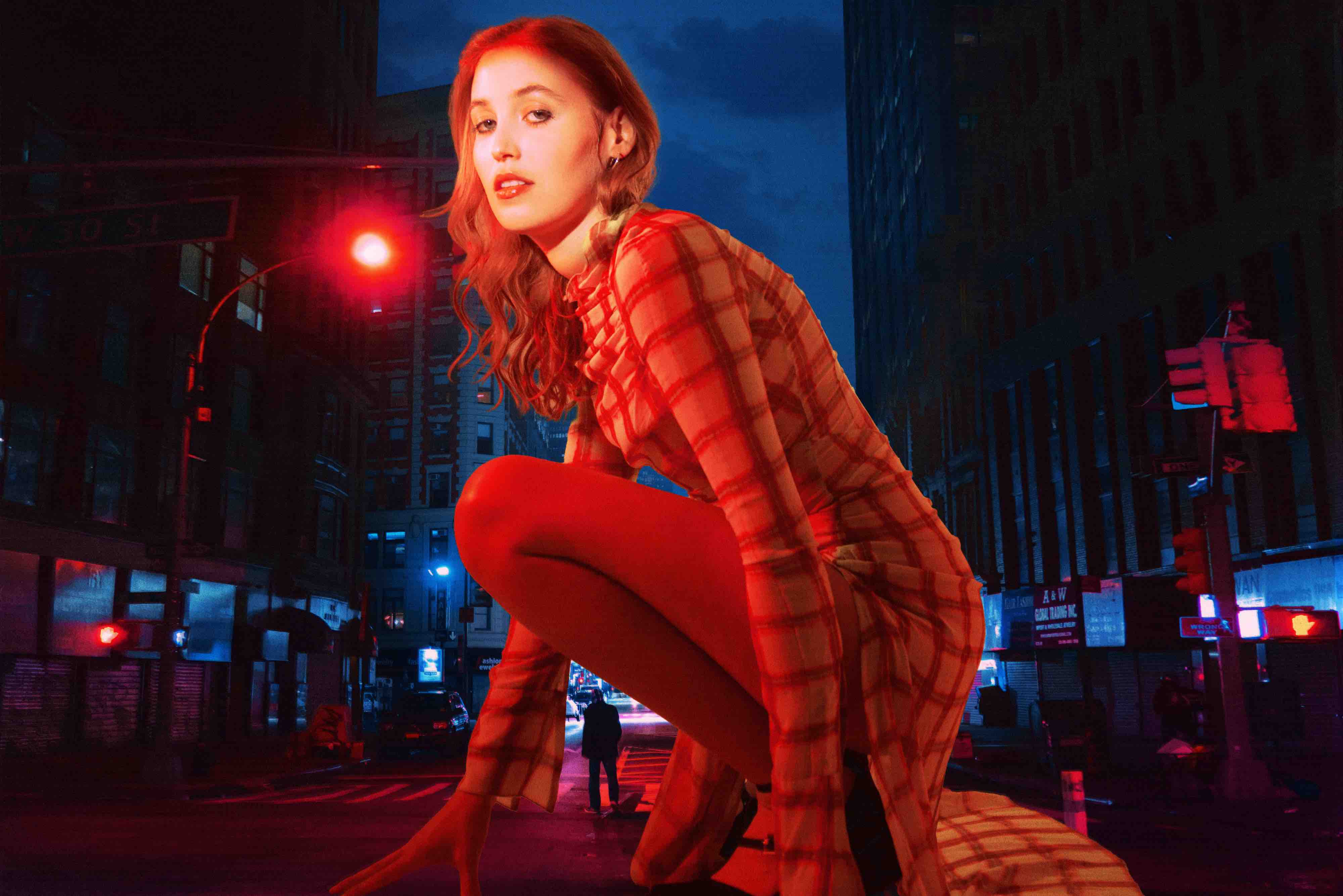Hatchie is ready to take flight. Since her first EP in 2018, there’s always been a sense of fluorescent elation to the Brisbane native’s blend of shoegaze and pop. On her latest album Giving the World Away, though, Harriette Pilbeam is more honest and fearless than before, bathed in iridescent light and graced with angel wings on the cover. If her debut was made for floating, lovesick fantasies, then its follow-up is more like a plunge into a sea of crushed stars: refreshing, kinetic, bright.
For the most part, the new album draws from the same well of influences as her past discography; during our interview, she nods to My Bloody Valentine, Curve, Madonna, and Kylie Minogue. But Giving the World Away also marks a new chapter for Pilbeam, with new collaborators (Jorge Elbrecht, James Barone, Dan Nigro) who have helped expand her sound alongside a more confessional approach to songwriting that tempers dissatisfaction and hope with tenderness. Despite recording the album under lockdown, Pilbeam seems as free and open as ever.
Was there anything that inspired you to take a more energetic direction for this album?
Going to other people’s shows before COVID in the second half of 2019 really made me realize how much I wanted to have that kind of exciting live show as well. I was going to a lot of shows and festivals and really enjoying sets that were a bit more high-octane and a bit more dancey. I just wanted my show to have more communication between me and the audience, and I think the best way to do that is to write songs that people really want to sing and move along to rather than songs that are just me behind the guitar. I still love those songs, and I still write those songs, but I just wanted to have more of a balance on this record.
“I just wanted my show to have more communication between me and the audience, and I think the best way to do that is to write songs that people really want to sing and move along to rather than songs that are just me behind the guitar.”
I love that you use that word, “dancey.” Is there anything you did to feel more present in your body?
When this record was being written and recorded we were going through lockdown, so I was spending more time with myself—I was exercising more and taking better care of myself and trying to be more present by journaling, which helped me be more aware of everything that was going on. When we recorded vocals, because it was just me and my husband Joe at home, I felt really comfortable. We were also living next door to a house that was being renovated, so we could only do vocals at night because they were too loud during the day. I’d have a few wines and just wind down while I was doing it. In the past, I’ve done all vocals for an album in one or two days, starting at 9 a.m., and I’d be very much in my work mode. So it’s nice to just relax a bit more and do it in my own time, in my own home.
How did co-writing the entirety of the album change the dynamic in the studio?
I was nervous at times, but because I did it all with my husband I felt really comfortable. I didn’t have too much trouble sharing lyrics; it just made me think more about what I was putting on the table. It made me work harder because you don’t want to waste other people’s time when you’re working with them. I really worked on putting my best effort into it. It’s just about letting go of ego and knowing what’s best for the song. It doesn't matter who came up with it; you just want the song to be the best it can possibly be. It really opened up my eyes to how different a song can sound and how far it can be pushed.

Besides having other people in the room, did anything else help push you out of your comfort zone to try new sounds?
Just having the time to try different things, because we weren’t on the clock at home; we weren’t spending money on studio time. We could take it as slow as we wanted, and we could do as many different versions of the song as we wanted. For a few songs on the record, I’ve got some demos that sound quite different. With “Take My Hand,” I did a different version that’s a bit faster, more dancey, and more like a song by Saint Etienne—a very different vibe. But we ended up going with the slower version because I felt like that balanced out the record a little bit. Being able to bounce ideas back and forth between Joe and myself also helped. A few songs he started writing and I helped finish. They come from two different brains, start in two different worlds, even if we both ended up working on them.
“With this one I tried to be more real and autobiographical, less fictional. I felt like I owed it to myself to have a record of how I actually feel and things that are actually happening to me rather than made up stories.”
Do you consider yourself a restless person, trying to push yourself past different boundaries with your music?
Definitely. I don't ever want to get too comfortable with one sound. I love when other people have a really particular sound and they stick with it, but for me, “restless” is a good word. I think I get bored pretty easily, and I want to try and hone different sounds and different experiences.
You’ve already seen a lot of critical success, and some of the songs on this album express the idea of disillusionment. Is there any particular moment that made you realize how dissatisfied you were with all the attention?
That was an ongoing feeling that I’d that really applied to various elements of my life—not just music, but also my friendships and everything in 2019. And I just felt really guilty for feeling that way because, on paper, obviously, my life was great. I’m a very privileged person: I’m white and I grew up in a stable home and my music was doing really well and I was in a happy relationship and I had friends. But my brain always found things to be unhappy about, and I was feeling really overwhelmed by that negativity. I realized that it was all just coming from me, and it was all internal. It was in my control, so I think I just needed to write about how I was upset with myself, with feeling that way, but it was time to move on. I just wanted to put those feelings in a song, and I think I think it’s really helped to give me perspective and realize how good I have everything.
Was this album sort of a way of writing the person you want to be into existence?
That’s a good way of putting it. With this one I tried to be more real and autobiographical, less fictional. I felt like I owed it to myself to have a record of how I actually feel and things that are actually happening to me rather than made up stories. I’m glad I did that, because this one’s more of an actual diary entry, and it definitely helps give me closure on certain things.
Was there anything specific about yourself that you really started to value and appreciate as you finished up the album?
I guess my sensitivity. I used to—and still sometimes—hate how sensitive I am, but I think it definitely helps me write and understand and empathize with other people. It can definitely be hard because I can get my feelings hurt really easily. And also just how much I really want this music to be out in the world, and how much I really want it to be heard. We’re super motivated to get it done because I’m really sick of waiting around to put music out. FL







